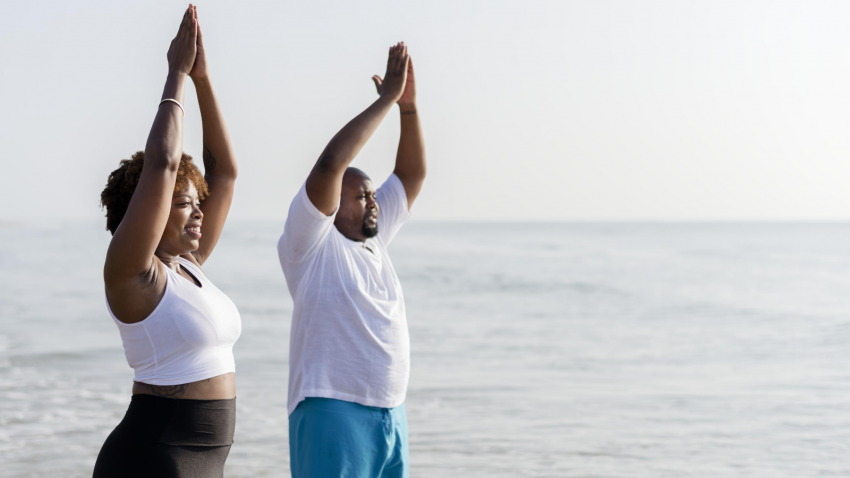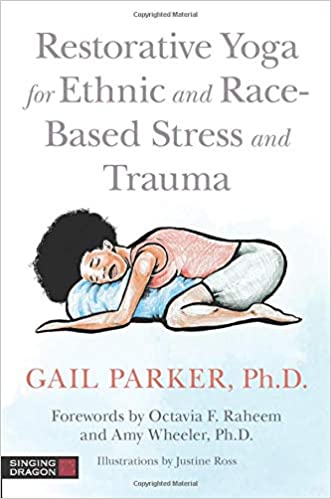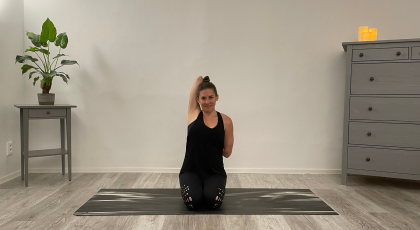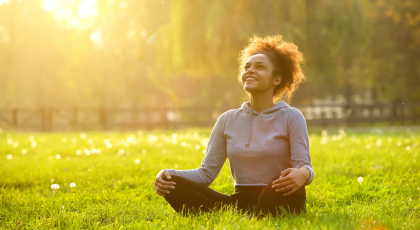View basket (0 items $0.00)

Book Review: Restorative Yoga for Ethnic and Race-Based Stress and Trauma
What role does yoga play in making the world more equitable and socially just? If whitewashed, stick-thin, Gumby-like models on Instagram or magazine covers are your only source of knowledge of yoga, it would seem that yoga’s role is very limited, if not detrimental.
And yet, many dedicated teachers and practitioners know that the practice goes beyond a superficial, physical level. We may feel that yoga has helped us to become less reactive, to examine our own internal biases, and to heal emotional wounds. But how? And can it do so for friends, for communities, or even for the world at large?
In her book, Restorative Yoga for Ethnic and Race-Based Stress and Trauma (2020), Gail Parker, Ph.D., C-IAYT, E-RYT 500, sheds light on these issues by describing the role that Restorative Yoga can play in  understanding and healing race-based emotional wounds. Among the hats that she wears, Parker is a psychologist, a certified yoga therapist, and a nationally and internationally renowned thought leader. In her book, she challenges yoga teachers, therapists, and practitioners of all races and ethnicities to think more deeply about their actions and reactions within a world that has been colored by racial and ethnic bias.
understanding and healing race-based emotional wounds. Among the hats that she wears, Parker is a psychologist, a certified yoga therapist, and a nationally and internationally renowned thought leader. In her book, she challenges yoga teachers, therapists, and practitioners of all races and ethnicities to think more deeply about their actions and reactions within a world that has been colored by racial and ethnic bias.
This book is incredibly useful not only for beginning the journey toward healing race-based trauma that lies within our bodies, but also in understanding how to engage in open, heartfelt dialogue with others without inflicting or reinflicting deeper emotional wounds.
In the first three chapters of the book, Parker lays the foundation for understanding the healing role that Restorative Yoga can play in ethnic and race-based stress and trauma. She does so by discussing the role of ethnic and race-based diversity in the yoga industry. Next, Parker introduces race-based stress and race-based trauma and how they are distinct from post-traumatic stress disorder (PTSD). She also provides a broad overview of the role that Restorative Yoga can play in regulating the nervous system and how this can in turn support social engagement.
Parker then builds on the foundation laid in the first three chapters by exploring ways that yogic concepts fit into ethnic- and race-based trauma. For example, Parker outlines the koshas (energetic layers of the body) and samskaras (mental impressions of our past habitual actions that are outside the scope of our awareness). She also discusses the use of the yamas (moral discipline that guides how we act with the outside world) and niyamas (positive observances concerned with our personal behavior) as guidelines in creating community. Thereafter, she describes spiritual activism and the role that the gunas (qualities of nature) can play within it.
Finally, Parker concludes with a chapter on practical instructions for teaching and practicing Restorative Yoga. This chapter ties together Parker’s guidance by providing tangible steps that readers can take to begin their own journey of healing through yoga.
Parker’s knowledge and authority on both race-based trauma and yoga are evident from the way that she weaves together yogic philosophy, psychology, and activism in her writing. Restorative Yoga for Ethnic and Race-Based Stress and Trauma is an essential read for anyone who is interested in the intersection of these topics and who aspires to create change through their yoga practice or teachings. Above all else,
Parker makes it clear that before adding to the noise of collective conversations on race-based trauma, it’s most beneficial to look inward.
Although it may be uncomfortable to do so, beginning to understand our own implicit biases, exploring our own emotional wounds, and learning how we may have wounded others are necessary pieces to the puzzle of activism. Parker’s book provides an ideal starting point in this challenging yet necessary work.
 Gail Parker, Ph.D. C-IAYT, RYT-500 is an author, a psychologist, a certified yoga therapist, and a lifelong practitioner of yoga. She became president of the Black Yoga Teachers Alliance (BYTA) Board of Directors in 2020. She is well known for her pioneering efforts to blend psychology, yoga, and meditation as effective self-care strategies that can enhance emotional balance, and contribute to the overall health and well-being of practitioners.
Gail Parker, Ph.D. C-IAYT, RYT-500 is an author, a psychologist, a certified yoga therapist, and a lifelong practitioner of yoga. She became president of the Black Yoga Teachers Alliance (BYTA) Board of Directors in 2020. She is well known for her pioneering efforts to blend psychology, yoga, and meditation as effective self-care strategies that can enhance emotional balance, and contribute to the overall health and well-being of practitioners.
Her first book, Restorative Yoga for Ethnic and Race-Based Stress and Trauma, offers self-care strategies and invites everyone, not just those directly impacted, to explore the intersection of yoga, race, and ethnicity, and to consider the psychological impact of race-based stress and trauma on all of us.
 Lacey Gibson Ramirez is a Boston-based ERYT-200 yoga teacher and a freelance writer. Through her teaching and writing, she seeks to make yoga accessible, inclusive, and equitable. Lacey has completed certifications in Prenatal Yoga and Barre as well as trauma-informed yoga trainings. Additionally, she holds a Masters of Science in Global Health and Population from Harvard T.H. Chan School of Public Health. To learn more and connect, visit her website laceygibson.com
Lacey Gibson Ramirez is a Boston-based ERYT-200 yoga teacher and a freelance writer. Through her teaching and writing, she seeks to make yoga accessible, inclusive, and equitable. Lacey has completed certifications in Prenatal Yoga and Barre as well as trauma-informed yoga trainings. Additionally, she holds a Masters of Science in Global Health and Population from Harvard T.H. Chan School of Public Health. To learn more and connect, visit her website laceygibson.com
Featured Courses









